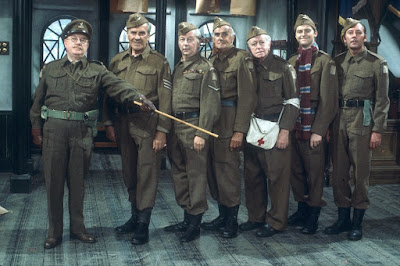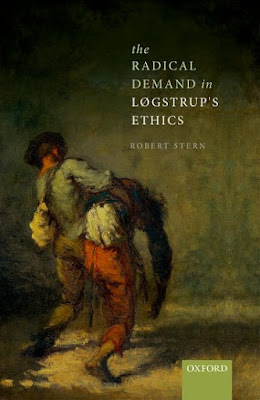Jesus’ proclamation about the need to show love, not indulgence—Dad’s Army, Knud Ejler Løgstrup and the ethical demand
 |
| The main cast of characters in Dad’s Army |
INTRODUCTION
A couple of weeks ago I had occasion to answer a question in the conversation after the address by using a scene from an episode called “A Man of Action” from the British 1970s comedy series ‘Dad’s Army’ in which Private Frank Pike gets his head stuck in the railings of a park gate. Today, I want to use it again in order to help me take a serious look at something about the structure of the ethical demand that was noticed by the twentieth-century Danish philosopher, theologian and ethicist Knud Ejler Løgstrup (1905–1981).
So here’s the story again but, as I begin, I should note that it’s taken from the version aired on the radio rather than the television. You can hear the radio episode at this link should you wish.
Private Pike and Corporal Jones are out on patrol and, as usual, are sharing humorous stories with each other, on this occasion centring on food. Pike tells Jones that once, when he was a child he tried to get his mum to buy him some chocolate when they were out shopping but she’d said ‘no’. As they walked home by the park Pike thought he’d give his mum a scare by sticking his head through the railings and pretending that he’d got it stuck. Not surprisingly his mum got into a terrible state and wanted to send for the Fire Brigade at which point Pike tells Jones that he pulled his head out and laughed, only for his now very angry mum to ‘give him one’. The grown-up Pike then proceeds to show Jones what he’d done all those years ago. Yes, you’ve guessed it, this time Pike’s, now adult-sized head, really does get stuck.
Corporal Jones telephones Captain Mainwaring back at their HQ in the Church Hall and to ask for help from the platoon. On arriving Mainwaring says to Pike a version of his famous catch phrase, ‘You stupid boy’. This is immediately followed by the air raid warning siren going off which serves to add considerable urgency to the proceedings. They all put their helmets on and quickly turn to thinking about how to get Frank’s head unstuck.
The first suggestion made is to call the Fire Brigade. Not surprisingly they might have other, rather more important, things to do in an air raid but, as Captain Mainwairing also quickly reveals, he doesn’t want anyone to know about this. It’s just too embarrassing for his pride to admit that a member of his platoon could do anything so stupid.
Then Private Godfrey, the platoon’s very elderly medical orderly, suggests using some petroleum jelly he has in his first-aid bag to smear over Pike’s head in order to help it slip through the bars. After having done this the members of the platoon pull on Pike’s legs but, to accompanying complaints and wails of pain, Pike’s head remains firmly stuck. In response to Pike’s outburst Captain Mainwaring simply says: ‘Once and for all, Pike, will you stop raising these petty objections.’ They try a second time, to no avail, but during this attempt a landmine is dropped creating a huge explosion nearby. Corporal Jones tells the platoon that he’d been worried that it was Pike’s head exploding and, once again, Pike complains and wails to which Captain Mainwaring delivers the brilliantly funny line which does not appear in the television version: ‘Will you be quiet Pike, this is nothing whatever to do with you.’
Forced by their failure and the possibility of further bombs dropping on them the platoon gather in a huddle away from Pike to think about other solutions. Corporal Jones suggests that, because Pike’s ears seem to be the problem, they should try cutting them off, one at a time. Captain Mainwaring demurs saying that Pike can’t go around with no ears to which Jones responds that it’s better than going around with no head. Fortunately it’s Sgt Wilson who then comes up with an immediate solution which is to take the park gate off its hinges and then take the gate and Pike together back to the Church Hall where it’s safer and they can have more time to think what to do. This they do and, on arriving back at the hall they string up the gate horizontally from the roof setting up the scene for further comedy as the episode unfolds.
—o0o—
READINGS
Leviticus 19:18
You shall not take vengeance or bear a grudge against any of your people, but you shall love your neighbour as yourself: I am the Lord.
When the Pharisees heard that he had silenced the Sadducees, they gathered together, and one of them, a lawyer, asked him a question to test him. ‘Teacher, which commandment in the law is the greatest?’ He said to him, ‘“You shall love the Lord your God with all your heart, and with all your soul, and with all your mind.” This is the greatest and first commandment. And a second is like it: “You shall love your neighbour as yourself.” On these two commandments hang all the law and the prophets.’
—o0o—
If a proclamation is to have any relevance for us it must answer to something in our own existence: a perplexity in which we find ourselves, and inescapable contradiction, a fate we refuse to accept, expectations we entertain, or difficulties that loom up before us. This is not to say that the proclamation, in order to be taken seriously, must explain our perplexity and contradiction in the same way we ourselves do, or call our expectations and difficulties by the same names that we use, much less solve our problems, answer our questions, save us from our fate, or fulfil our desires in the ways we have imagined. Indeed, the proclamation may express itself in a manner which is strange to us, it may even be at odds with everything we have imagined, without our necessarily turning a deaf ear to it—provided that it does touch upon something in our existence.
—o0o—
ADDRESS
Jesus’ proclamation about the need to show love, not indulgence—Dad’s Army, Knud Ejler Løgstrup and the ethical demand
In his 1956 book, the ‘Ethical Demand’, Løgstrup asks ‘What attitude to the other human being is implicit in Jesus’ proclamation? What view does it take of what is essential in our lives with and against each other, and how can that be stated in purely human terms?’ (ED, p.3).
In attempting to answer this question Løgstrup wants to provide us with an ethics which relates meaningfully to the example of Jesus regardless of whether one has a belief in God [howsoever understood] or not. In a liberal religious, free-thinking community such as our own which is, in general, highly skeptical about all our old monotheistic conceptions of in what consists God but which still values highly the example of the human Jesus, this is a very important ethical project and I whole-heartedly recommend his book to you as well as the recent commentary upon it by Robert Stern (The Radical demand in Løgstrup’s ethics, Oxford University Press, 2019).
Løgstrup ‘states that the “character of the demand contained in the proclamation of Jesus” is that it is “silent, radical, one-sided and unfulfillable” and all these characteristics ‘set the ethical demand apart from conventional social demands and norms’ (see Robert Stern in his essay Gift or a given? Knud Løgstrup and the demands of life). In the time available to me here I can only introduce you to one of these characteristics, namely, that the ethical demand proclaimed by Jesus is silent in some fashion, that is to say it is ‘unspoken; it is not expressed by the other person (ED, p. 20). As we will see this ‘may express itself in a manner which is strange to us’ and ‘may even be at odds with everything we have imagined.’
There might be many ways to show this characteristic but, given the seriousness of the subject and my conclusion, it won’t do any harm to show it first of all in a humorous way, namely, in the scene from Dad’s Army I précised for you earlier.
When the platoon first arrives on the scene they immediately hear what seems to be, not an unspoken ethical demand, but one spoken very clearly by Pike who is demanding of the platoon that, then and there, they show their love to him by helping to release him from the railings. He may be a stupid boy, as Captain Mainwaring quickly and inevitably reminds him but, nevertheless, on arrival the ethical demand seems clear and it is one and which seems to be clearly spoken to them by their neighbour, Pike.
But then, almost immediately, we hear the air-raid siren sound which signals a real, immediate danger to the safety of the whole platoon and serves to hasten their attempts to respond to the ethical demand as it seems to be being expressed by Pike.
In the first instance, as we know, this takes the form of smearing petroleum jelly all over Pike’s head in the hope that it will help him slip it out from between the railings. Alas, on pulling his legs firmly, not only does his head not come free, but it also causes Pike considerable pain and so, naturally, he wails and complains. Captain Mainwaring, with typical pompous insensitivity, instantly responds to Pike by saying, ‘Once and for all, Pike, will you stop raising these petty objections.’
For a second time the platoon pulls hard on Pike’s legs but this attempt also fails and only causes Pike to wail and complain even more vociferously than before. In the middle of this second attempt a huge landmine is dropped and explodes nearby causing a panicky Corporal Jones to say that he thought it might have been Pike’s head exploding. Not surprisingly this turn of events ups the ante considerably and serves to cause Pike to wail and complain even more than before. It is at this point that Captain Mainwaring responds with a wonderful, classic line: ‘Will you be quiet Pike, this is nothing whatever to do with you.’
It’s a very funny line, of course, because up until this point in the proceedings it seems that everything going on is most certainly to do with Pike and so Mainwaring must, therefore, be wrong. But I have long suspected that our laugh is as loud as it is because we also intuitively sense that there is, in fact, real insight and wisdom hiding in Captain Mainwaring’s apparently daft words because they help to reveal something structurally important about the silent, unspoken character of the demand contained in the proclamation of Jesus that we must love our neighbour as ourselves.
What we need to see here is that when the platoon arrived Pike’s spoken demand was probably, more or less, coinciding with the silent, unspoken ethical demand; they both seemed to be demanding the platoon showed love to their neighbour by trying to set Pike free then and there. In short, the two demands seemed to be one and the same.
However, once the air-raid begins and their first plan to release him fails, Mainwaring’s words help us see that Pike’s spoken demand and the silent, unspoken ethical demand implicit in the very structure of existence itself are, in fact, not the same. Sometimes they may align and appear to be the same but, more often than we realise (or would wish), they do not align.
We can all see that what their neighbour Pike explicitly demands is required for the platoon properly to be showing their love to him, may not now be the best way for them to heed the silent, unspoken ethical demand and so truly show love him. All this serves to remind us that, as Løgstrup says, ‘Any correspondence between the spoken and the unspoken demand is purely accidental; usually they are not at all alike’ (ED, pp. 20-21). It also serves to remind us of the uncomfortable truth that, because the true ethical demand is always silent and unspoken we always-already have no choice but to be interpreting ourselves — with no guarantee of success — what that demand is actually asking us to do despite the often quite loud, distracting and sometimes contradictory spoken demands being made by our neighbour or by established social norms and conventions. As Løgstup notes,
‘The situation may be such that I am challenged to oppose the very thing which the other person expects and wishes me to do for him or her, because this alone will serve his or her best interest. In other words, the challenge rests on the assumption that I know better than he or she does what is best for him or her’ (ED, p. 21)
In the case of loving their neighbour Pike as they love themselves the platoon now has to rise to this challenge and interpret the silent, unspoken ethical demand very differently from the way Pike is demanding they interpret it. Given the urgency of the situation with the threat of further large bombs beginning to drop around them, the only way they could actually accede to Pike’s spoken demand to be released there and then would be, as Corporal Jones suggests, to cut off his ears. Although certain situations can be imagined when cutting off Pike’s ears to save his life might be the best way to show him love, in this context, the platoon do not interpret the silent, unspoken ethical demand in this fashion and they seek another way forward, a way suggested by Sgt Wilson, namely, to take the gate off its hinges and take it and Pike and themselves back to the relative safety of their HQ in the Church Hall. They meet the challenge of the silent, unspoken demand on this occasion by deciding they do know better than Pike does what is best for him.
Another point to see in Captain Mainwaring’s words to Pike that ‘this is nothing whatever to do with you’ is that the silent, unspoken ethical demand experienced in any face to face encounter is not something the platoon or their neighbour Pike can invent or create themselves, but something independent of them, something which transcends them as individual creatures, something that Løgstrup calls a ‘fact of creation’ (ED, p.21). In this sense the ethical demand is nothing to do with the platoon as individual human beings but is, instead, part of the deep structure of existence. Another way of putting it might be that the silent, unspoken ethical demand shapes/makes them rather than they shape/make it.
It’s also important to see throughout this that responding to the silent, unspoken ethical demand can never be ‘merely a matter of fulfilling the other person’s expectations and granting his or her wishes’. If that were the case then the platoon’s encounter with Pike would ‘mean nothing less than — irresponsibly — making [themselves] the tool of the other person’ (ED, p. 21). Once any person or group starts behaving like this, then their apparent love of neighbour would turn out merely to be a form of flattery. As Løgstrup reminds us, Jesus’ proclamation is an encouragement for us always to be keeping open to ‘the demand for love, not for indulgence’ (ED, p. 21).
So, to sum up, by claiming that the ethical demand is silent, unspoken, Løgstrup means that it cannot be articulated in two fundamental respects. Gratefully paraphrasing Robert Stern, here’s what they look like in connection with our story.
First, in responding to the needs of another person, in this case Pike, the platoon cannot simply do whatever it is that Pike asks them to do, because that may not reflect his genuine needs.
Secondly, the platoon cannot simply appeal to established social norms and conventions, because there may not be any such norms and conventions governing the case, and even if they were to exist, in the actual ethical situation they found themselves, it was always up to them to take responsibility for how they decided to act, rather than just relying on such norms.
Now, with this comic illustration firmly in mind, I want, very, very briefly, to turn to the contemporary, pressing reason I have for alerting you to Løgstrup’s idea that the silent, unspoken ethical demand is a fact of creation to which we must all always-already be paying attention and
rising to the uncomfortable challenge that, in some cases, we need to act on an educated sense that we know better than our neighbour does what is best for them.
I hope this Dad’s Army scene can stand as a gentle and humane reminder to us as a people who wish to be liberal and cosmopolitan in our religion, politics and expressions of cultural identity that, whilst we must always make every effort to pay close attention to the spoken demands of our increasingly noisy, less liberal, nationalistic and identitarian religious and political neighbours (some of whom we may, alas, also feel are becoming enemies), because the character of the silent, unspoken ethical demand contained in the proclamation of Jesus is for love, not for indulgence, we must sometimes be prepared bravely, and without (alas) any absolute guarantees we are correct, to take the decision that we do know better than our neighbour does what is best for them and to act upon our decision despite the wails, complaints and conflict it will certainly elicit.
Nothing less than than this kind of courageous, ethical action saved Pike in his situation and, though we — I — may wish it were otherwise, it seems likely that nothing less than this will, in our situation, save our society’s liberal and cosmopolitan expressions of religion, politics and cultural identity.
But, to conclude, in everything and at all moments we must keep firmly in mind that Jesus’ proclamation is always-already alerting us of the need always to show love, not indulgence.


